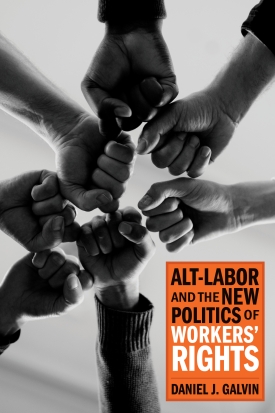
Alt-Labor and the New Politics of Workers’ Rights
About This Book
Selected as a 2024 Noteworthy Book in Industrial Relations and Labor Economics Princeton University Industrial Relations Section
"Daniel Galvin offers readers a superbly incisive, empirically eclectic, narratively compelling analysis of the contemporary politics of workers’ rights. Alt-Labor and the New Politics of Workers’ Rights perceptively charts and contextualizes striking shifts in the American political economy that have profoundly altered the experiences of low-wage workers. What’s more is that Galvin brilliantly centers the agency and power of marginalized workers and the organizations that advance their interests in the face of significant and ongoing structural challenges. Scholars of American politics, students, organizers, and anyone who cares about the fate of American workers will find insight and inspiration in Galvin’s skillful description and analyses of the politics of alt-labor."
—JAMILA MICHENER, associate professor of government and public policy and senior associate dean of public engagement, Brooks School of Public Policy, Cornell University
"The relentless decline of U.S. unions in recent decades is both a cause and a consequence of the devolution of the bedrock New Deal–era labor law that institutionalized collective bargaining rights for broad swaths of the nation’s labor force. In this lucid, deeply researched study, Daniel Galvin analyzes the rapid expansion of state and local laws governing minimum wages, paid leave, and other conditions of employment, and exposes the challenges that shift presents for the ‘alt-labor’ groups that are increasingly leading the fight for workers’ rights."
—RUTH MILKMAN, Distinguished Professor of Sociology, School of Labor and Urban Studies and the Graduate Center, City University of New York
"Dan Galvin’s book adds exponentially to the scholarship on worker centers and ‘alt-labor’ and so much more. It masterfully traces the shift from labor law to employment law, the consequential turn toward policy and enforcement at the state and local levels, and the strategic capacity worker centers have had to build to carry it out. It thoughtfully engages the puzzle of how organizations with so little have managed to accomplish so much. Alt-Labor and the New Politics of Workers’ Rights is deeply researched, theoretically rich, full of powerful insight, and beautifully written to boot."
—JANICE FINE, professor, Rutgers School of Management and Labor Relations and Workplace Justice Lab@RU
Over the last half century, two major developments have transformed the nature of workers’ rights and altered the pathways available to low-wage workers to combat their exploitation. First, while national labor law, which regulates unionization and collective bargaining, has grown increasingly ineffective, employment laws establishing minimal workplace standards have proliferated at the state and local levels. Second, as labor unions have declined, a diversity of small, under-resourced nonprofit "alt-labor" groups have emerged in locations across the United States to organize and support marginalized workers. In Alt-Labor and the New Politics of Workers’ Rights, political scientist Daniel J. Galvin draws on rich data and extensive interviews to examine the links between these developments. With nuance and insight, Galvin explains how alt-labor groups are finding creative ways to help their members while navigating the many organizational challenges and structural constraints they face in this new context.
Alt-labor groups have long offered their members services and organizing opportunities to contest their unfair treatment on the job. But many groups have grown frustrated by the limited impact of these traditional strategies and have turned to public policy to scale up their work. They have successfully led campaigns to combat wage theft, raise the minimum wage, improve working conditions, strengthen immigrants’ rights, and more. These successes present something of a puzzle: relative to their larger, wealthier, and better-connected opponents, alt-labor groups are small, poor, and weak. Their members are primarily low-wage immigrant workers and workers of color who are often socially, economically, and politically marginalized. With few exceptions, the groups lack large dues-paying memberships and are dependent on philanthropic foundations and other unpredictable sources of funding. How, given their myriad challenges, have alt-labor groups managed to make gains for their members?
Galvin reveals that alt-labor groups are leveraging their deep roots in local communities, their unique position in the labor movement, and the flexibility of their organizational forms to build their collective power and extend their reach. A growing number of groups have also become more politically engaged and have set out to alter their political environments by cultivating more engaged citizens, influencing candidate selection processes, and expanding government capacities. These efforts seek to enhance alt-labor groups’ probabilities of success in the near term while incrementally shifting the balance of power over the long term.
Alt-Labor and the New Politics of Workers’ Rights comprehensively details alt-labor’s turn to policy and politics, provides compelling insights into the dilemmas the groups now face, and illuminates how their efforts have both invigorated and complicated the American labor movement.
DANIEL J. GALVIN is professor of political science at Northwestern University and faculty fellow at the Institute for Policy Research.
Awards
2024 Noteworthy Book in Industrial Relations and Labor Economics
Princeton University Industrial Relations Section
